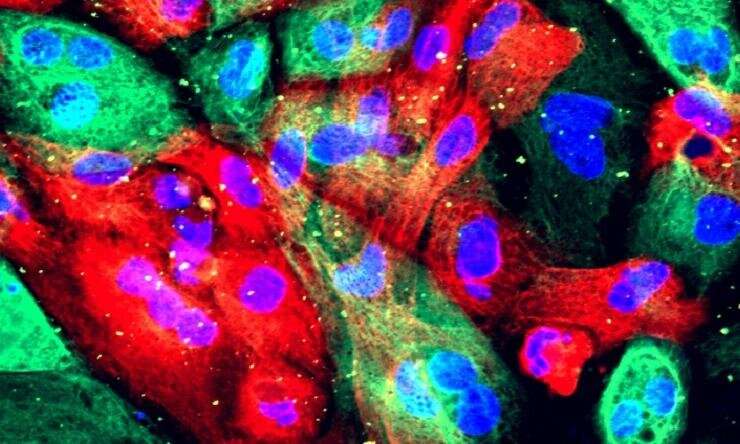Study shows which patients with advanced prostate cancer will benefit from chemotherapy

Researchers have recommended changes to how cancer patients are treated, after a new UCL-led study discovered that chemotherapy is significantly more effective for some men with advanced prostate cancer than others.
On average, docetaxel chemotherapy improved 5-year survival by 10% compared to standard hormone therapy, which works by reducing the levels of male hormones in the body to stop them from reaching the cancer cells.
And both treatments may be offered to all men diagnosed with advanced prostate cancer.
However, the research, which was presented at the American Society of Clinical Oncology (ASCO) and funded by Prostate Cancer UK, found that men who had many metastases (secondary cancer tumors) when they were diagnosed benefitted most from docetaxel chemotherapy, with 39% surviving five years, compared to 26% who had hormone therapy alone.
Among those with many metastases who also had larger prostate tumors, 55% survived for five years after having the treatment, compared to just 20% of men who just had hormone therapy.
In this study, those with many metastases or “high volume” metastatic disease, had either four or more secondary tumors in the bones and/or any metastasis in an organ such as the liver or lungs.
Meanwhile, men with fewer than 4 bone metastases (“low volume”) and who had been diagnosed with prostate cancer at an earlier stage, did not benefit from docetaxel chemotherapy at all.
Around 47,500 men are diagnosed with the cancer each year, with 6,000 cases classed as advanced.
These findings could allow chemotherapy to be targeted to men who will benefit the most, while others can be offered different treatments, such as radiotherapy to the prostate, or drugs including abiraterone, enzalutamide or darolutamide, to extend their lives further and allow them to avoid unnecessary side effects of chemotherapy, such as nausea, hair loss and infections.
Dr. Claire Vale (MRC Clinical Trials Unit at UCL), says that “research into new prostate cancer treatments can be incredibly expensive and can take a long time, so this type of analysis that makes the best use of the information we already have can make a big difference.”
“Even then it’s extremely rare to find such clear links between the characteristics of the patient and how effective their treatment is going to be. In this case, the evidence is clear, and we want to make sure it’s incorporated into clinical practice as soon as possible.”
The next step for the team will be to evaluate how docetaxel chemotherapy interacts with other treatments to understand who will benefit most from different combinations of these drugs.
Dr. Hayley Luxton, Research Impact Manager at Prostate Cancer UK, says that “this is really exciting because it shows exactly how we can ‘treat smarter, not harder’ and get the most from existing prostate cancer treatments.”
Source: Read Full Article


